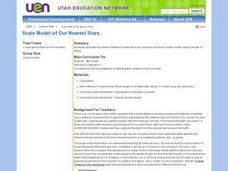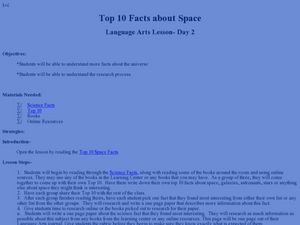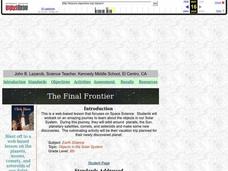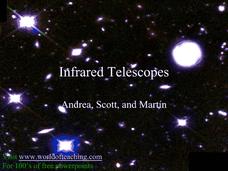K5 Learning
The Astronomy Project
A passage about an astronomy lesson may leave readers starstruck. Fifth graders read about a class's exploration into the makeup of the galaxy and its constellations before answering six questions about the terms and vocabulary words...
NASA
The Atmospheric Filter
What is the difference between a comet and a meteoroid? An educational lesson includes five demonstrations of how the atmosphere can inhibit our ability to measure many things in the galaxy.
K5 Learning
Miss Mitchell's Comet
Maria Mitchell discovered a comet, became the first female astronomer in the United States, and even has a crater on the moon named after her! Learn more about her passion for the stars with an informative reading passage, followed by...
NASA
Discovering the Milky Way
What do you call a tiny collection of galaxies? A puny-verse! Young scholars graph data gathered by scientists studying Cepheids. They attempt to identify a relationship between the variables through standard and logarithmical graphing....
Curated OER
Scale Model of Our Nearest Stars
Sixth graders calculate a light day, light hour, and light minute from the standard of a light year. After establishing the distances, a one meter scale is created to demonstrate the distance between the sun and the planets of our solar...
NASA
Stellar Fingerprints and Doppler Red Shifts
Young scientists observe the spectra of elements and compare that to the Doppler effect. Hook scholars from the beginning all the way to the extension activities in this 5E-format lesson.
Curated OER
Learning from Light: The Big Bang
Learners explore what astronomers are able to examine our galaxy and universe by examining light. They explore in this sub-unit the formation of the universe, commonly called "The Big Bang," and it follows studying from the Light: The...
Curated OER
Solar System
In this space science worksheet, middle schoolers complete each statement with the correct word or phrase related to the solar system. Then they locate each of the planets in a word search that follows.
Curated OER
Top 10 Facts About Space
Students create their own Top 10 Facts about any topic related to space. In this space lesson, students work in groups to produce a Top Ten List of facts about space and share with their classmates. Groups choose a fact to research and...
Curated OER
Into The Universe
In this space science worksheet, students find the solution to find the different heavenly objects through identifying the pictures.
Curated OER
The Universe-Scientific Notation Extension
In this scientific notation worksheet, students write a set of 9 average distances in standard form, then complete 3 additional problems. A reference web site is given for additional activities.
American Museum of Natural History
Being an Astronomer: Neil deGrasse Tyson
An interview delves deep into the life of famous astronomer Neil deGrasse Tyson.
International Technology Education Association
Singin' the Black and Blues
How does the color of the sky change from blue to reds and oranges to black? An illuminating lesson explains how light travels through different mediums using the sun's light as an example. By examining diagrams and illustrations, pupils...
Curated OER
Beyond Black Holes
Students research the universe, including the Milky Way and other galaxies. They investigate black holes in space. They create a replica of a galaxy on posterboard using Crayola Neon Twistables for concentric rings found in the galaxy....
Curated OER
A Galactic Fact Sheet
In this galactic fact worksheet, learners read through important facts about galaxies, their shapes, and distances from the Sun.
Curated OER
Solar System
In this solar system, students review information about the planets found in our solar system. Students complete 15 fill in the blank questions and then find the 9 planets in a word search.
Curated OER
Solar System (Lesson 2)
Eighth graders identify the objects that make up the solar system. They define new vocabulary and practice using them. They discover that the sun is a star.
Curated OER
Powers of 10
Students explore universe, and examine how big it really is and how scientists measure the distances or sizes of things by estimating sizes of different objects and reading and writing numbers in scientific notations.
NASA
Things Are Not Always What They Seem
Science is magic that works. Magical color-changing beads and a coffee can that follows voice commands are just two examples of magic tricks that rely on science. After completing a hands-on activity and an experiment investigating the...
Curated OER
Planets in Our Solar System
Each member of a four-student group takes on a specific aspect of an assigned planet to research. After gathering information, the team works together to create a travel brochure and a presentation intended to convince other classmates...
Curated OER
May the Force be with You -- All about Force and Gravity
Here is a fabulous set of teacher's notes that will make your next hands-on gravity and force lab fun and interesting. These notes provide you with three activities that allow children to make and test hypothesis regarding force,...
Chapman University
The Standard Model Poster
Chemistry classes will appreciate this color-coded, single-page reference sheet for The Standard Model of particle physics. It is divided into two main sections: elementary particles and compound particles, both with their antiparticles....
Curated OER
Infrared Telescope
Most of the twenty slides in this presentation include photographs or diagrams, making it an eye-catching way to teach about infrared telescopes. The pros and cons of using infrared light to study outer regions of space are explained....
Curated OER
Scientific Notation III
In this scientific notation worksheet, students solve 10 problems where they multiply and divide numbers using scientific notation and they express their answers with the proper number of significant figures.

























